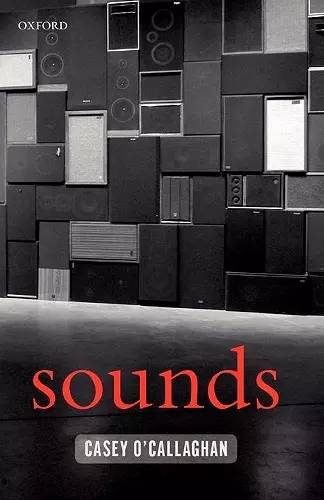Sounds
A Philosophical Theory
Format:Paperback
Publisher:Oxford University Press
Published:14th Jan '10
Currently unavailable, and unfortunately no date known when it will be back
This paperback is available in another edition too:
- Hardback£105.00(9780199215928)

Vision dominates philosophical thinking about perception, and theorizing about experience in cognitive science has traditionally focused on a visual model. In a radical departure from established practice, Casey O'Callaghan provides a systematic treatment of sound and sound experience, and shows how thinking about audition and appreciating the relationships between multiple sense modalities can enrich our understanding of perception and the mind. Sounds proposes a novel theory of sounds and auditory perception. Against the widely accepted philosophical view that sounds are among the secondary or sensible qualities, O'Callaghan argues that, on any perceptually plausible account, sounds are events. But this does not imply that sounds are waves that propagate through a medium, such as air or water. Rather, sounds are events that take place in one's environment at or near the objects and happenings that bring them about. This account captures the way in which sounds essentially are creatures of time, and situates sounds in a world populated by items and events that have significance for us. Sounds are not ethereal, mysterious entities. O'Callaghan's account of sounds and their perception discloses far greater variety among the kinds of things we perceive than traditional views acknowledge. But more importantly, investigating sounds and audition demonstrates that considering other sense modalities teaches what we could not otherwise learn from thinking exclusively about the visual. Sounds articulates a powerful account of echoes, reverberation, Doppler effects, and perceptual constancies that surpasses the explanatory richness of alternative theories, and also reveals a number of surprising cross-modal perceptual illusions. O'Callaghan argues that such illusions demonstrate that the perceptual modalities cannot be completely understood in isolation, and that the visuocentric model for theorizing about perception - according to which perceptual modalities are discrete modes of experience and autonomous domains of philosophical and scientific inquiry - ought to be abandoned.
Review from previous edition Sounds is impressive. It is carefully argued and well-written. . . . In addition to presenting a novel theory of sounds, he sets a stage on which other theorists must perform by articulating challenges that any account of sounds must meet. This book will be of interest to anyone working in the philosophy of perception. . . . Philosophers have a lot to learn by attending to distinct sense modalities and how they interact, and O'Callaghan's book is an excellent place to start. * John Kulvicki, Mind *
The prose and arguments are very clearly framed and the book reads well ... There is much to tweak one's interest. * Don Ihde, International Journal of Philosophical Studies *
A great deal of effort has been expended within both of these excellent books in order to contribute to the transformation of the philosophical study of sound and auditory perception ... as an exercise of paradigm-shifting and consciousness-raising, the potential impact of Sounds is huge. * Anthony Gritten, British Journal of Aesthetics, (Review of Sounds and Sounds and Perception) *
- Winner of Awarded an Honourable Mention for the American Philosophical Association Book Prize 2009.
ISBN: 9780199575503
Dimensions: 215mm x 137mm x 12mm
Weight: 280g
208 pages